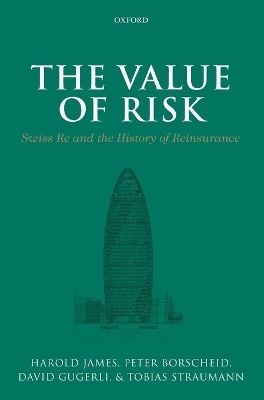
The Value of Risk
Oxford University Press (Verlag)
978-0-19-968980-4 (ISBN)
Reinsurance is an invisible service industry which enables insurance companies to insure more risks and to make better use of their resources. Until recently, reinsurers were only known to a small minority outside the insurance community. Major disasters, especially those caused by natural catastrophes, have increasingly brought the industry into the spotlight. Yet what is perceived today by a wider public still only represents a fraction of the industry, and the mechanisms of reinsurance to deal with global risk exposure are virtually unknown. The Value of Risk provides an overview of how today's reinsurance industry developed. It investigates for the first time the role of reinsurers in a changing risk, economic, and market environment.
Harold James explains the fundamental principles of insuring and outlines the evolution of the industry in his introductory essay. In Part I, Peter Borscheid describes in detail the global spread of modern insurance, which emerged in the late eighteenth century amidst ideas of rationalism which attempted to quantify risk in monetary terms, the setbacks it encountered, and how the market environment changed over time. Professional reinsurance emerged with the rise in insured risks in the industrialising mid-nineteenth century. By the time the San Francisco Earthquake happened in 1906 the reinsurance industry had become well established and showed a remarkable ability to deal collectively with the catastrophe. David Gugerli describes in Part II how the industry as a whole dealt with such challenges but also the numerous exposures to a changing risk landscape. Against this background, in Part III Tobias Straumann examines the history of the Swiss Reinsurance Company, founded in 1863, providing a fascinating example of how professional risk taking was developed over the last 150 years.
Harold James is Professor of History and International Affairs in the Princeton University, and studies economic and financial history and modern European history. His books include The End of Globalization (2001); Family Capitalism: Wendels, Haniels and Falcks (2006); The Creation and Destruction of Value: The Globalization Cycle (2009); and Making the European Monetary Union (2012). In 2004 he was awarded the Helmut Schmidt Prize for Economic History, and in 2005 the Ludwig Erhard Prize for writing about economics. He is also Marie Curie Visiting Professor at the European University Institute, and writes regularly for Project Syndicate. Peter Borscheid is Professor Emeritus of Economic and Social History at the University of Marburg. He has published numerous monographs on the history of science and technology, the history of the textile industry, the standard of living, the history of old age and old-age pension, the cultural history of acceleration. He led several projects and international working groups on insurance history. He also served as a member of the German government commission "The situation of the older generation in the Federal Republic of Germany". He is co-editor of World Insurance (2011, OUP). David Gugerli is a Professor of History at the Department of Humanities, Social and Political Sciences of the Federal Institute of Technology (ETH) in Zurich. His main interest is in the history of technology and science, social and economic history and cultural history. His recent publications include Transforming the Future - ETH Zurich and the Construction of Modern Switzerland 1855-2005 (2010) and The World as a Database: On the Relation of Software Development (2012). He is the editor of Interferenzen. Studien zur Kulturgeschichte der Technik (18 volumes) 1999-present. Tobias Straumann is Lecturer in the History Department of the University of Zurich and the Economics Department of the University of Basel. He studied at the Universities of Bielefeld and Zurich and the Ecole des Hautes Etudes en Sciences Sociales in Paris. After a career in economic journalism, he was a visiting scholar at the University of California at Berkeley and lecturer at the University of Lausanne. Dr. Straumann has worked in the fields of Swiss business history and European financial and monetary history. He has published articles in the Journal of Contemporary History, the European Review of Economic History, and the Historische Zeitschrift. His latest book is Fixed Ideas: Small States and Exchange Rate Regimes in Twentieth-Century Europe (Cambridge University Press).
Preface: The Value of Reinsurance ; Introduction: The Insuring Instinct ; PART I: GLOBAL INSURANCE NETWORKS ; 1. The Early Years ; 2. Expansion ; 3. Backlash ; 4. Division ; 5. Times of Crisis ; PART II: COOPERATION AND COMPETITION ORGANIZATION AND RISKS IN THE REINSURANCE BUSINESS, 1860 - 2010 ; 6. Introduction ; 7. Reinsurance Comes into its Own 1860-1960 ; 8. Structural Problems and Diagnostic Diversity 1960-1980 ; 9. The Global Market and Liberalisation 1980-2010 ; 10. Conclusion ; PART III: THE INVISIBLE GIANT THE STORY OF SWISS RE, 1863-2013 ; 11. Introduction ; 12. Establishment ; 13. Crash and Salvation ; 14. Crossing The Pond ; 15. Reaching the Top ; 16. On the Precipice ; 17. Aversion and Adaptation ; 18. World War II ; 19. Growth and Cultural Change ; 20. The Big Restructuring ; Glossary ; Bibliography ; Index
| Zusatzinfo | Numerous colour plates |
|---|---|
| Verlagsort | Oxford |
| Sprache | englisch |
| Maße | 181 x 249 mm |
| Gewicht | 1054 g |
| Themenwelt | Geschichte ► Teilgebiete der Geschichte ► Wirtschaftsgeschichte |
| Betriebswirtschaft / Management ► Spezielle Betriebswirtschaftslehre ► Versicherungsbetriebslehre | |
| ISBN-10 | 0-19-968980-6 / 0199689806 |
| ISBN-13 | 978-0-19-968980-4 / 9780199689804 |
| Zustand | Neuware |
| Haben Sie eine Frage zum Produkt? |
aus dem Bereich


